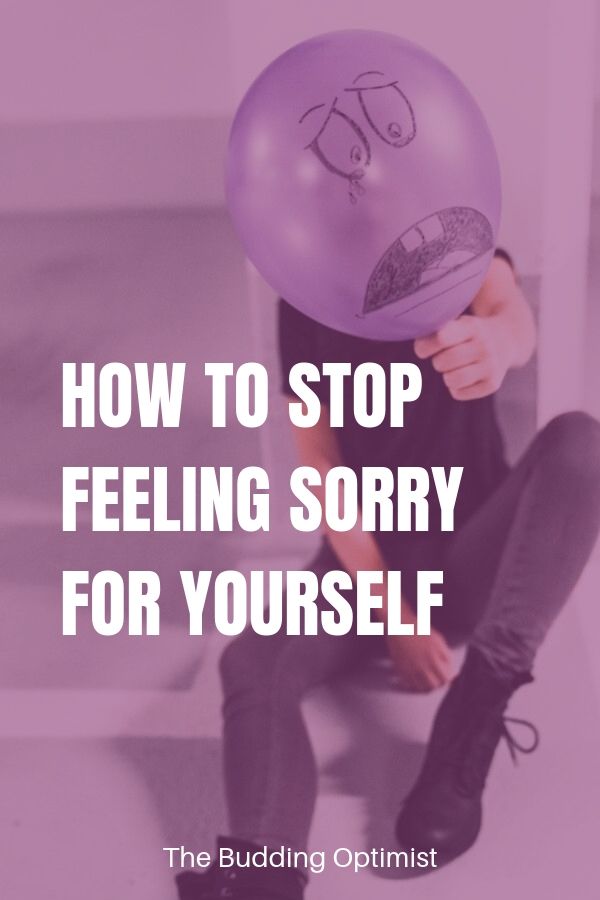How to Stop Feeling Sorry for Yourself and What to Do Instead
“You got to stop feeling sorry for yourself all the time.” He said.
He was an older man, with a booming voice and lively expressions that spoke of his Italian heritage. Angelo was his name.
He was the designated volunteer driver of the day—part of a charity program that provided free transportation for cancer patients to and from the hospital. I was his first “customer” of the day.
He asked me if I was feeling alright soon after I got in the car. He could tell I was not in a good mood.
I was months into my chemotherapy treatment, with months still to go. I was as bald as an eagle and pale as a ghost. My legs felt like jello and I couldn’t walk more than a few minutes without a break. So yeah, I was not in the best mood.
At first, I didn’t want to talk. But it was hard to say no to Angelo. He was determined to cheer me up and his laughter was contagious enough to entice anyone into a conversation. So we talked.
Before long, he started to tell me his story—he was diagnosed with two cancers at the same time some decades ago and was given a mere 10% chance of survival. Despite the odds, he made it through. And he continued on to live a full and happy life. At the time we met he was in his late 70’s. If he hadn’t told me his age, I would have thought he was at least 10 years younger.
“How did you do it?” I asked. “How did you manage to stay so healthy and happy all these years?”
He looked at me with a smile in his eyes. “You won’t ever be truly happy if you keep thinking your life’s terrible, you know? And if you don’t feel good inside,” he said, “your body won’t feel good either.”
“If you want to live a good life, you got to stop feeling sorry for yourself all the time.”
And he was right.

How Self-Pity Hurts Your Happiness & Wellbeing
We all know what self-pity feels like. I’d be surprised if you’ve never felt sorry for yourself. After all, it is a common human emotion.
And you know what, there’s nothing wrong with feeling sorry for yourself once in a while. I don’t believe in eradicating all negative emotions like they’re the plague. But if you can’t stop feeling sorry for yourself, you need to pay attention. Chronic and excessive self-pity can lead to more than just a sour mood.
According to a study in Finland, feeling like a failure can lead to hardening of the arteries, which increases the chance of heart attacks and strokes.
Self-pity also reinforces feelings of hopelessness and worthlessness. Both are linked to depression and can leave you paralyzed in inaction.
Self-pity also contributes to helplessness. When you wallow in self-pity, you view yourself as the “victim”—unable to do anything to change the outcome. This, in turn, will deter you from achieving true happiness in life.
But how can you tell if you’re pitying yourself too much?
Read on to find out!
Signs You Are Feeling Sorry for Yourself Excessively

Here are 7 signs of chronic self-pity:
- You don’t believe you’re worthy of good things
- You can’t think of anything you’re good at
- When people praise you, you feel they’re just “being nice” or have an ulterior motive
- You constantly compare yourself to others and feel you don’t measure up
- You often mull over painful memories and wonder “why did that happen to me?”
- You think life is unfair and yet you’re powerless in changing it
- You have a habit of putting yourself down
If you have one or more of the above signs, you’re pitying yourself too much. But the good news is you can do something about it.
How to Stop Self Pity
After I spoke with Angelo that day, I went home and reflected on what he said. I decided I wanted to conquer my illness and go on to live a happy and healthy life just as he did, so I took his advice and started working on changing my mindset. I’m now 10 years cancer-free and living the life I’ve set out to live—one without the gnawing feelings of self-pity.
And now I offer you 7 tips I learned from my own journey in the hope that they may be able to help you stop feeling sorry for yourself.
1. Expand Your World
When your world is small and inward, it’s hard to put things in perspective. A tiny obstacle can feel like an impossible challenge. A minor setback can seem like a gigantic failure. Even a run-of-the-mill “bad day” moment can make you feel like the unluckiest person on earth.
After all, your world is too small to serve as a good reference point. The solution then is simple: expand your world. Meet more people—preferably those who are unlike you in many ways. Learn about different cultures and how other people live. And take an interest in people and things outside your usual realm of awareness.
Travelling can help, but you don’t HAVE to go anywhere. Even a day or two volunteering at the local hospital or homeless shelter will help open your eyes to the world at large. This, in turn, will help keep your self-pity in check by showing you where your problems lie in the grand scheme of things.
2. Exercise Your Sense of Agency
Sense of agency is the feeling that we have control over our lives. Having a strong sense of agency is instrumental in warding off feelings of helplessness and self-pity.
But how can you develop a strong sense of agency? By focusing your energy on what you can control instead of on things you have no control over.
For example:
You may not have the power to determine what happens to you in a day, but you have the power to choose how you respond to whatever that happens.
If the traffic is terrible, you can choose to be calm rather than irritated.
If you make a mistake at work, you can choose to forgive yourself and try to learn from it instead of beating yourself up and sulking the rest of the day.
And if your partner says something mean, instead of getting angry right away, you can choose to communicate your feelings in a more productive manner and give both of you a chance to clear away any misunderstanding.
It won’t be easy at first, but if you exercise your agency muscles often enough, you’ll feel more in control no matter what happens to you.
Now if you need a little reminder to help you remember to focus your energy on what you can control, the following quote might be of help:
God, grant me the serenity to accept the things I cannot change, the courage to change the things I can, and the wisdom to know the difference.
—Reinhold Niebuhr
I’m not religious (spiritual, but not religious) so I usually switch out the “God” in the quote with “Universe”. But you do whatever works for you!
3. Do Something Good for Others
When you do something good for others, you’re doing something good for yourself too. And it’s not just wishful thinking—there’s actual science behind it. Take this study headed by psychologist Jennifer Crocker, for example, which shows that giving and caring for another person helps boost self-esteem.
But the key is to do it with the pure intention of giving. If you’re only showing generosity to get something in return, it won’t work.
So look for opportunities to do something good for someone other than yourself. Get your coworker a cup of coffee. Donate clothes you haven’t worn in a while. Or volunteer at the local animal shelter. These are just a few examples of simple things you can do to help others if you don’t have a lot of time or room in your budget.
4. Pay Attention to Negative Self Talk
If you were to pay attention to how you talk to yourself, you’d realize that a lot of times, you’re pretty darn mean. In fact, you’re a bully.
How do I know? Because I’m a bully to myself sometimes. I often catch myself saying horrid things to myself. They go something like this:
Your hair is just terrible, how can you walk out of the house like this?
Ugh. Look at what you did. You spilled food on yourself again. Can you do anything right?
You’re not smart at all. Not compared to her.
Any of these sound familiar?
If so, it’s time to cut down the negative self-talk. Talking to yourself like this won’t get you anywhere—it’s only wasting your time with unproductive thoughts and fueling your self-pity.
But how can you reduce negative self-talk? First, you need to build awareness. You can only successfully change a behaviour if you become more aware of it.
So begin building awareness by asking yourself the following questions throughout the day:
- When was the last time I “talked” to myself?
- What did I say to myself and why?
- How did I feel about myself afterward?
Soon you’ll be able to identify any negative self-talk patterns and catch them as soon as they pop into your head.

5. Practice Self Affirmation
Once you’ve become better at recognizing negative self-talk, it’s time to work on changing the way you speak to yourself. One of the best ways to do this is through practicing self-affirmation.
Research shows that self-affirmation not only helps reduce chronic stress and improve problem-solving skills, it can also protect our self worth in the face of failure.
There are many ways you can practice self-affirmation. One of my favourite methods is to record self-affirmations with the free ThinkUp app. You can customize and record your own self-affirmations with this app and even add background music if you like. It’s a handy little app that will make practicing self-affirmations easy and fun for everyone.
Give it a try!
6. Push Yourself Out of Your Comfort Zone
A dose of confidence can go a long way in boosting your sense of self-worth. But let’s face it, you won’t ever get to test yourself and gain confidence by staying within your comfort zone.
Why? Because the comfort zone is familiar, it’s safe, and it’s…kind of boring. The comfort zone offers little challenge and almost no reward. Stay in it long enough and you’ll start to question whether you’re capable of doing anything else besides what you’ve already done a million times. When “I can’t” or “I don’t know how” becomes your motto, it’s hard to shake off feelings of self-pity.
So as uncomfortable as it may be at first, make it a habit to do something that challenges your comfort level on a regular basis. For example, take on a new project at work in an area that you don’t completely understand. Or try a new sport that makes you a little nervous (dodgeball, anyone?).
And don’t worry if you don’t succeed. It’s normal to fall repeatedly when you try anything new. But if you do succeed, applaud yourself for the win and relish in the fact that you just racked up more confidence points that’ll help you feel less sorry for yourself.
7. Embrace Positive Experiences and People
I’ve said it many times on this blog—including at the beginning of this article—that I don’t believe in suppressing or banishing all negative emotions. So if you tried the above strategies and still can’t stop feeling sorry for yourself, don’t sweat it. Because if you try too hard to stomp out all negative emotions, it might backfire on you. Your efforts—though well-intended—might create further anxiety, guilt, and remorse.
Instead, try focusing more on creating positive experiences in your daily life and surrounding yourself with positive people.
Why?
Because we only have so much time in a day and so much room in our minds. The more time and energy we devote to doing activities we love, making joy-filled memories, and talking to people who inspire us with hope, the less time and mental space we have for negative emotions like self-pity.
Remember, it’s impossible to eliminate all negative feelings and emotions. They’re a part of what makes us living and breathing human beings. Rather than hating the way you feel about yourself, accept that it’s how you feel right now and remind yourself you won’t always feel this way.
It’s been more than 10 years since I met Angelo in that car ride to the hospital. I think he would be proud to see the change his words inspired in my life.
And now I’m trying to be someone else’s Angelo. Will you help me spread the word? Share this article with someone in our life. Let’s inspire positive changes together!
Recommended Articles in Personal Growth and Mental Wellbeing:
How to Get Over Regret and Start Enjoying Your Life
The Keys to Loving Yourself Unconditionally
3 Questions to Help Curb Excessive Worrying (Plus Free Workbook)





Thank you Karen, I’m glad my story was able to resonate with you. Wishing you an abundance of joy and peace!
This story has inspired me in so many ways! Thank you for sharing!
I believe in a God that heals!
2 Corinthians 13:11